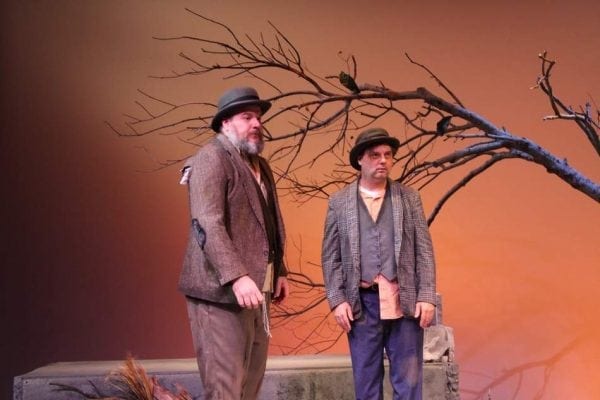
Hat Trick’s Godot — The Waiting isn’t the Hardest Part
Theater Review by Julie Garisto
May 31, 2018
After seven-odd decades, theatergoers still trickle into see Samuel Beckett’s absurdist masterpiece Waiting for Godot expecting it to be a conventional play with run-of-the-mill conflict and resolution. Some even flee during intermission.
Yes, that’s right — with Google searches, et al., people will still throw down more than $20 a ticket and not read up on the play they’re attending.
During our viewing of Hat Trick’s superb production of Godot at Ruth Eckerd Hall’s Murray Theatre, the couple next to us complained throughout the first act and left during intermission, as did as a few others.
In a way, you could chalk it up to life imitating art.
In the play, hobo Vladimir, nicknamed Didi, eagerly awaits the arrival of a man named Godot as his road-weary companion Estragon, affectionately dubbed “Gogo,” suffers excruciating pain in his feet and kidneys. As they wait and engage in strangely meta and surreal conversations, they encounter the pompous Pozzo, who drags around and tortures a slave — ironically named Lucky. Lucky is silent at first but eventually finds his voice but lunges at one of the hobos instead of his master because he’s commanded to do so.
Unfair, right? This and many of the other exchanges in Godot point at the incivilities of civilization — all the while making us laugh at Joe Winskye’s deftly directed, Marx Brothers-like gags. When viewed with an engaged, critical mind, Beckett’s mix of humor and commentary is utterly brilliant.
The figure of Godot has been interpreted as the easy answer to all that ails passive citizens who don’t think critically, work hard and look beyond the obvious to solve societal problems. They’ve been conditioned by their family, church or other organizations to think — in the same manner, Lucky does what he’s told and attacks Estragon, an innocent bystander.
The mid-20th-century play about aspirations conjures all sorts of quick fixes we crave — like an easy-to-follow comedy on a rainy Sunday afternoon.
The walk-outs’ at Murray Theatre may have thought they’d be lulled into a passive stupor that allowed them to forget about their struggles and the world and all its failings. Their Godot for the afternoon was an easy payoff, not being challenged to listen closely or dealing with an unconventional story and characters, surrealism, absurdities. A total avoidance of heady wordplay and complex symbolism.
These theatergoers failed to appreciate that Hat Trick’s play offered no shortage of entertainment — both thanks to Godot and Hat Trick’s expert production. In just about every review of Hat Trick Theatre Company, the performers and crew receive praise for their exceptional presentation of physical comedy — pratfalls, brawls and other antics — all utterly hilarious and handled with finesse. Each member of the cast was top notch — Brian Shea perfectly bumbling and neurotic as Vladimir; Holloway, an endearing grump as Estragon; Steven Fisher, exquisitely douchy as Pozzo; and Paul McColgan conveyed all the struggles of mankind and fetched laughs as Pozzo’s slave, Lucky.
I agree with Andrew Meacham’s impressions of the set in the Tampa Bay Times: “Mike Shine’s set, an abandoned file drawer and a small brick pile and a bare tree. Gauzy lavender lighting adds more comfort than Beckett’s script, which is unsparing, irritating and brilliant.”
Holloway, also Hat Trick’s Artistic Director, shared after the run that Godot is his favorite play of all time.
“Somehow it seems to be everything,” he said. “It’s tragic and hilarious, it’s hauntingly poetic but somehow straightforward, it’s about nothing and everything all at once. My favorite thing about the play is the struggle to keep hope alive … and the friendship of Didi and Gogo. You hope right along with them.”
Indeed, the duo’s perseverance and loyalty to one another leaves us on a positive note. Beckett reminds us that, despite all of the inequities and tragedies of humanity, love keeps us going.
That love can be as pure and simple as the bond shared by two hobo buddies.
Holloway added praise for director Winskye: “Joe has done a gorgeous job of honoring Beckett’s intentions while still telling the story in a unique way. His goal was for accessibility. He wanted to make a Godot that someone who’d never seen a play could watch it and go, ‘yeah…I think I get it.'”




